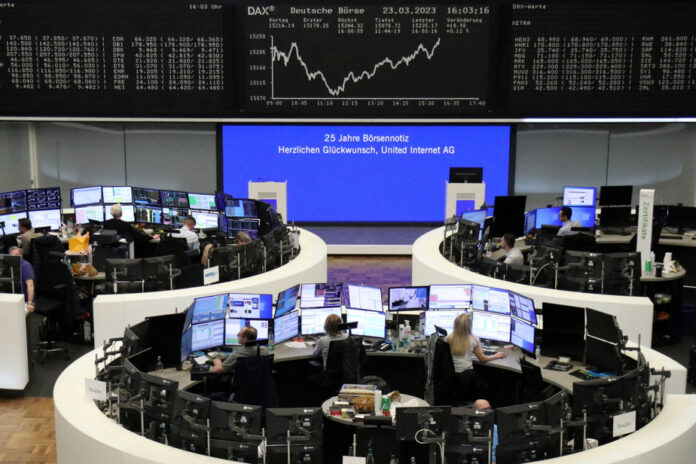(Paris) European stock markets ended in disarray on Thursday as Wall Street rebounded, hoping to see the end of monetary tightening approaching.
London fell 0.89% after the Bank of England decided to hike its rate by 0.25 percentage points to 4.25%, a high since late 2008.
The Zurich market fell by 0.59% after the decision of the Swiss National Bank, which worked to secure the emergency takeover of Credit Suisse by its rival UBS this weekend, to raise its rate by 0, 50 percentage points.
On the other hand, Paris (0.11%) and Frankfurt (-0.04%) ended without much trend.
On Wall Street, indices rebounded from their fall the previous day, helped by weaker dollar and bond yields: the Dow Jones gained 0.90%, the tech-heavy NASDAQ 1.79% and the index S
The US Federal Reserve (Fed) on Wednesday raised its key rate by only a quarter of a percentage point in a context undermined by the banking crisis.
And looking ahead, the majority of the 18 Fed officials anticipate an additional quarter-point rate hike.
“Basically, with the 25 basis point rate hike, investors got exactly what they were hoping for,” notes Konstantin Oldenburger at CMC Markets.
Many market participants also believe that the disruptions experienced by banks since the collapse of Silicon Valley Bank (SVB) could help offset the need for further rate hikes.
“Stresses in the banking sector will contribute to slowing economic activity, demand, and ultimately inflation, so less action will be needed from the Fed to tighten financial conditions sufficiently,” write Tiffany Wilding and Allison Boxer, economists at Pimco.
“As a result, the Fed is likely nearing the end of the bullish cycle,” they say.
In Europe, investors witnessed several rate hikes on Thursday.
On the bond market, government bond yields fell sharply, particularly those with short maturities, which are very sensitive to interest rates.
The Bank of England (BoE) raised its key rate by 0.25 points, mimicking the Fed and the Bank of Norway, while warning that “if ‘inflationary’ pressures persist, further tightening of monetary policy will be necessary “.
The European Central Bank decided last week to raise rates by 0.5 points, despite tensions in the banking sector.
The mega-bank born out of the forceps of the union between UBS and Credit Suisse risks posing competition problems in Switzerland, the president of the Swiss central bank also acknowledged on Thursday. But for him, there was no other solution to avoid a catastrophe.
Shares of Credit Suisse lost 3.61% and UBS 4.33%. The German Deutsche Bank (-3.18%), Commerzbank (-4.14%) or the French Societe Generale (-2.33%) and BNP Paribas (-2.18%) followed the same trend. The banking sector of the broader Stoxx Europe 600 index fell 2.47%.
The price of the defense group which entered the Dax40 on Monday continues to climb (2.0%, 10.1% since Monday). The German Ministry of Defense announced on Thursday that it wants to acquire more than 100 Boxer-type wheeled armored vehicles, manufactured by Rheinmetall.
The dollar weakened against other major currencies: against the euro, the US currency lost 0.38% to 1.0898 dollars per euro after falling to 1.0930 dollars, its lowest since early February.
Around 12:50 p.m. (Eastern time), the British currency took 0.48% to 1.2327 dollars and 0.08% to 88.41 pence for one euro. Earlier, it hit its highest in nearly two months against the dollar, at $1.2344 to the pound.
Oil prices are falling: the barrel of Brent from the North Sea for delivery in May lost 0.86% to 76 dollars, while the barrel of American WTI at the same maturity fell by 0.85% to 70.30 dollars.















